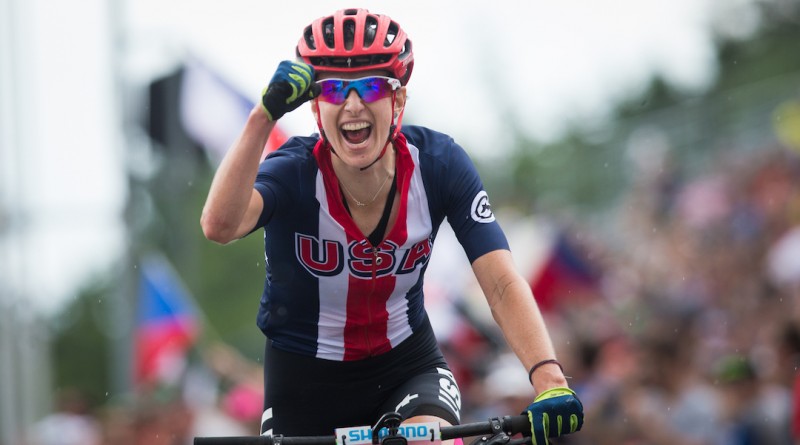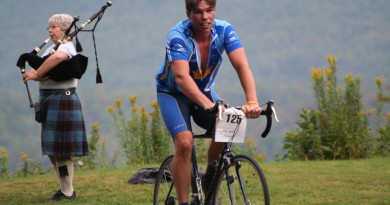Can Lea Davison Grab an Olympic Medal?
Coming off a World Championship silver medal, Jericho’s Lea Davison stands a good chance at an Olympic mountain bike medal in Rio this Saturday at 11:30 a.m. You can stream it on NBC here.
It’s noon in late July on one of the hottest days of the summer and Jericho’s Lea Davison is riding around the Catamount Outdoor Center in Williston on her Specialized race bike. As she comes to a stop, throngs of young girls, members of the Little Bellas program Lea and her sister Sabra founded, crowd around waiting for autographed posters.
Lea Davison is, in the words of the U.S. Cycling Team, “America’s best chance for an Olympic medal in mountain biking.” On Aug. 20, she will represent the U.S. racing on the purpose-built Olympic cross-country course in Rio, a 5K route with a 40-degree incline log staircase, footprint-shaped rock gardens and rock slab jumps.
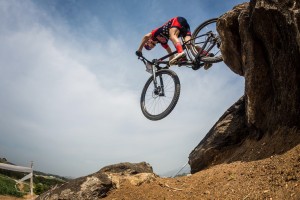
At 5’6” and 125 pounds Lea is lean and fit as a colt. Despite the heat, she barely breaks a sweat. “Yeah, this weather is good training for Rio,” she says, shaking out her long pony tail. “When we rode the test run in Rio last year, it was like 100 degrees. There are no trees on the course, so it can be brutal.” As she raises her water bottle to take a big chug, a scar is visible on her forearm. She sees me glancing at it, “Yep, six stitches,” she says. The injury happened two months earlier on a steep, rocky course in La Bresse, France. It was the third World Cup of the season. Lea was sitting in 11th place overall in the World Cup standings.
To automatically qualify for Rio she had to finish in the top three at La Bresse and move into the top 10 in the UCI Mountain Bike World Cup Cross Country standings. Lea was in the top five and pushing hard when her front tire slipped on a root and she went tumbling. Another rider came up fast and crashed into her. With one and a half laps to go, Lea picked up her damaged bike and then rode one-handed up the climb. Lea later wrote on her blog: “The last thing I wanted to do was navigate the technical descent two more times with a gushing elbow, bent handlebars and a wobbly front wheel. This was not ideal. But I did it because in Olympic years, you do anything.” She finished 18th.
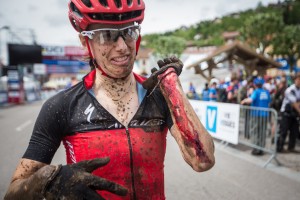
But by July 2, Lea was back on her game. At the World Championship in Nove Mesto, Czech Republic, she pulled out of her pedal on the first climb and found herself back in the pack. “I was in 29th, 30 seconds off the lead, but I had this goal of attacking the whole way,” she says. “I looked for every opportunity I could to pass.” And pass she did, gaining 25 places in three laps. Coming into the last lap she passed the third place woman in the feed zone, earning her a silver and moving her up to fourth in the overall World Cup standings. “That’s the best finish of my life!” Lea says, grinning from ear to ear.
Training Hard, Training Fast
It’s also the best finish for any American since 2001, when Alison Dunlap was the World Champion. Over the last season, Lea has been working out harder than ever with her coach, three-time Tour de France racer and Williston resident Andy Bishop.
“The course in Rio is pretty smooth and fast with some rock gardens thrown in so we’ve been doing a lot of road training,” she says. Bishop, riding a scooter, has paced her on four hour rides where she’ll average 25 mph. “He’s good at pushing me,” she admits.
Two years ago, Lea rode the Vermont Gran Fondo, which links four gaps (Lincoln, Appalachian, Middlebury and Brandon). “Andy told me to go all out up Lincoln Gap.” It was only the second time in her life that she’d ridden that route—the steepest paved mile in America at a 24 percent grade. According to Strava (the GPS software many cyclists use to track their training rides) that day Lea not only set the QOM (Queen of the Mountain) title for fastest female on that section of road, she also set the KOM (King of the Mountain), for fastest male.
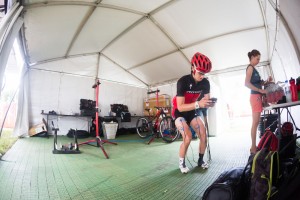
To build on that strength, she rides six to seven days a week, and does a two- to four-hour ride every other day. Bill Knowles, the founder of Killington’s ISport, works with her on strength training, and nutritionist Stacy Sims on her diet. “I have trouble actually eating enough,” she says. “Sometimes I’m so hungry I wake up at night and have to go eat a banana. Some nights, it’s three bananas.” During the day, it’s Clif Bars (her sponsor) with extra protein, or nut butter, maple syrup and sandwiches.
Physically, Lea is at the top of her game, having fully recovered from two hip surgeries, one in 2010 and another in 2014. In 2014, she came back stronger than ever, winning a bronze at the UCI World Mountain Bike Championships in Norway. Rio will be Lea’s second Olympics, having finished a solid, if not stellar, 11th in London in 2012. “I was just so excited to even be there,” she says. Going into this Olympics, she is more confident: “Any one of the top 15 women could medal—Maja (Wloszczowska), Annika (Langvad), Jolanda (Neff), or … me.”
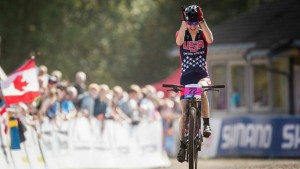
The Mental Edge
What will make the most difference in Rio, Lea admits, is who has the mental edge and who’s on that day. “The Olympics are different from a World Cup: it’s the smallest, biggest race you’ll ever do, with just 32 girls on the start line and the whole world watching.” A big part of her recent success Lea attributes to mental training. “I’ve been working with a sports psychologist on really just being in the present,” she says. “I get so excited when I’m leading I sometimes lose focus,” she admits. “Or when you are suffering—and believe me, by the fourth lap you are—your mind starts to wander and you need to bring it back and just focus on the action at hand. I really attribute my recent silver medal to my mind being able to make that pivot.” Beyond all the coaches Lea works with, perhaps her biggest support team is her family, especially her sister, Sabra, whom she lives with and talks to regularly when she’s competing at events around the world. “When I was over in Europe, Sabra and I were texting one morning at 4 a.m. and she texts: ‘I don’t know why I have to give you these pep talks. I don’t care about the results, the Little Bellas don’t care about the results, you shouldn’t care about the results. You’re doing great.” “She was right. When I stopped focusing on the results, I ride better in the present. Besides…” Lea pauses and looks around at the Little Bellas she comes to visit on Sunday sessions when she’s in town, “…this—these girls are what really matter.”

